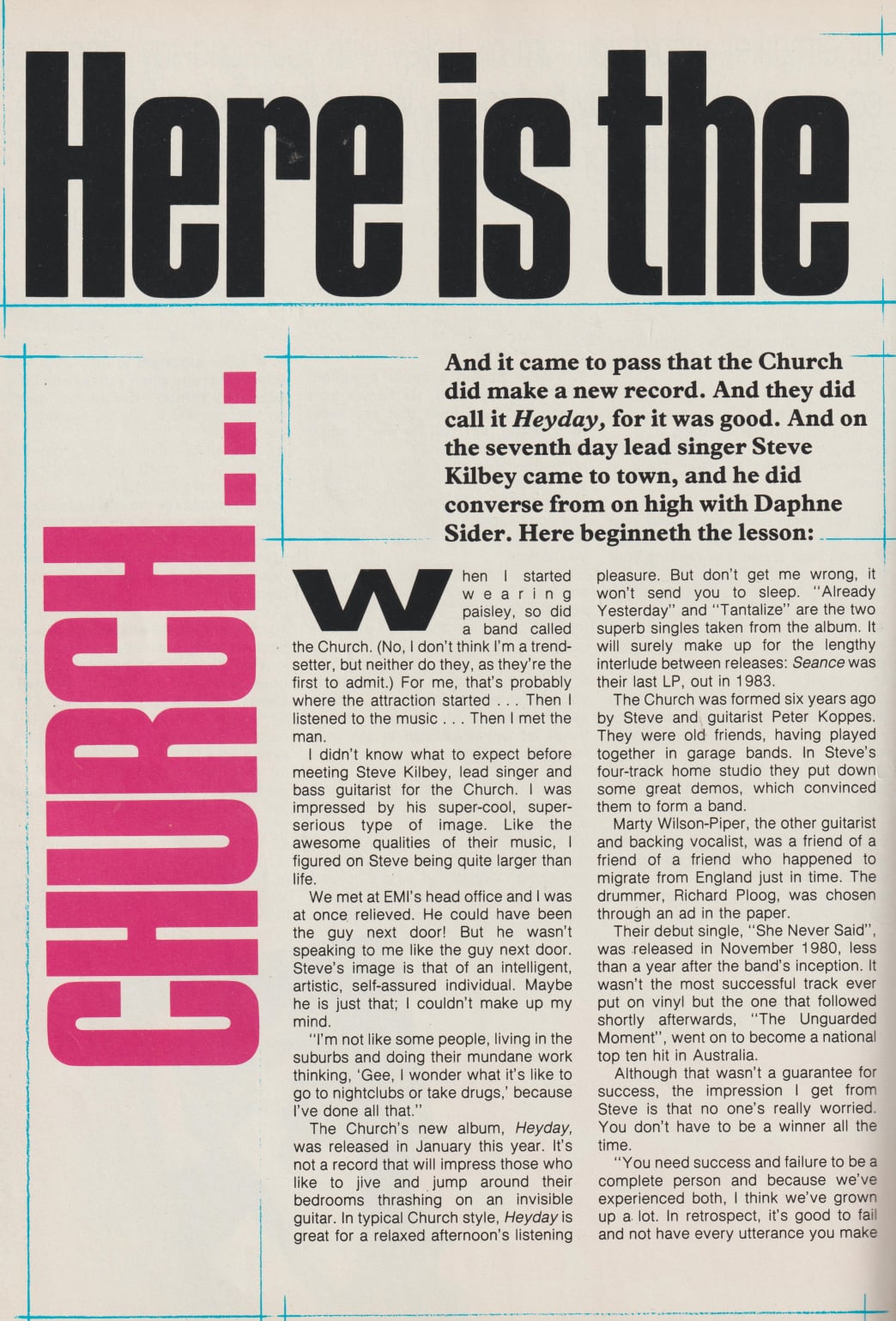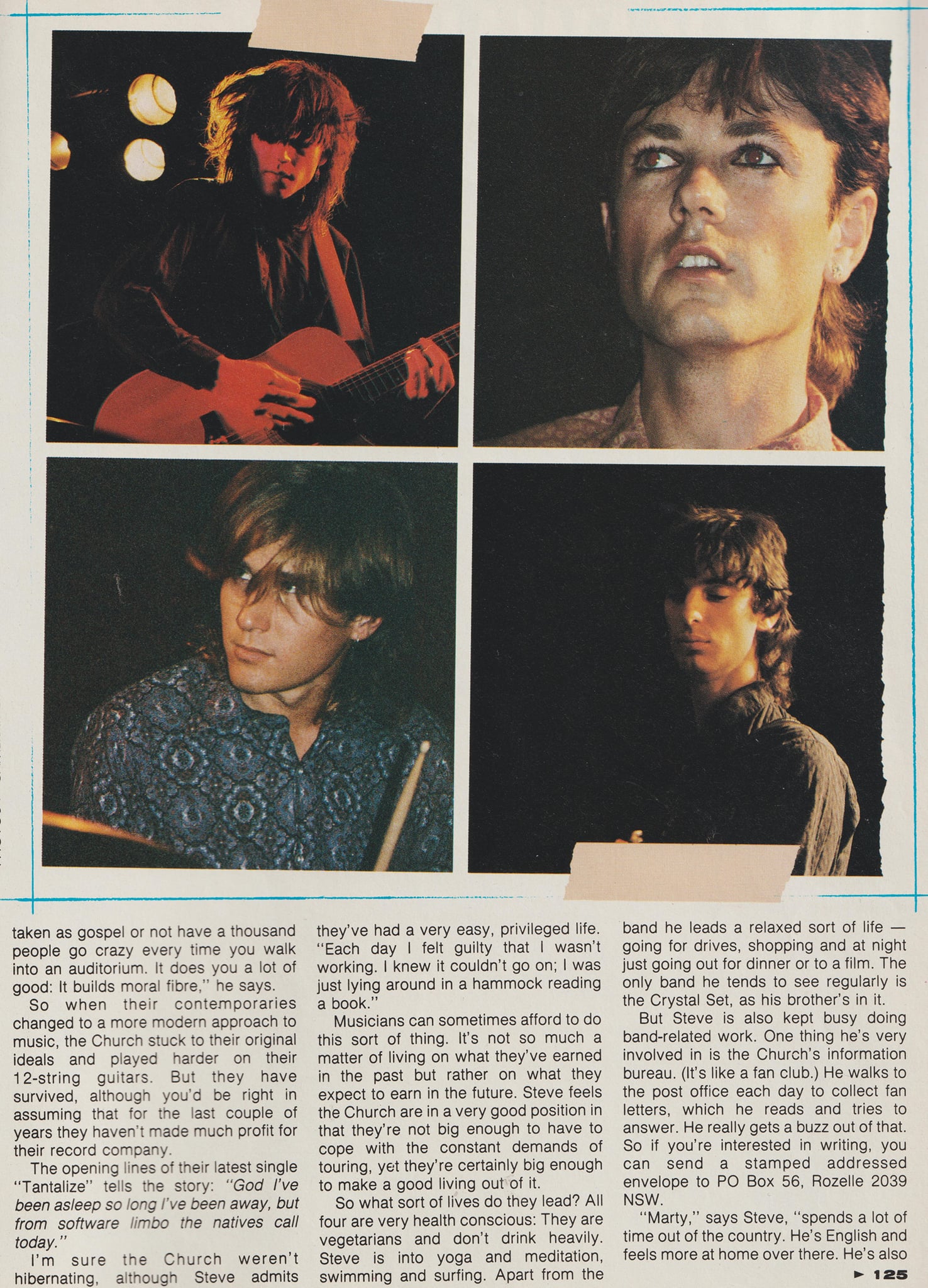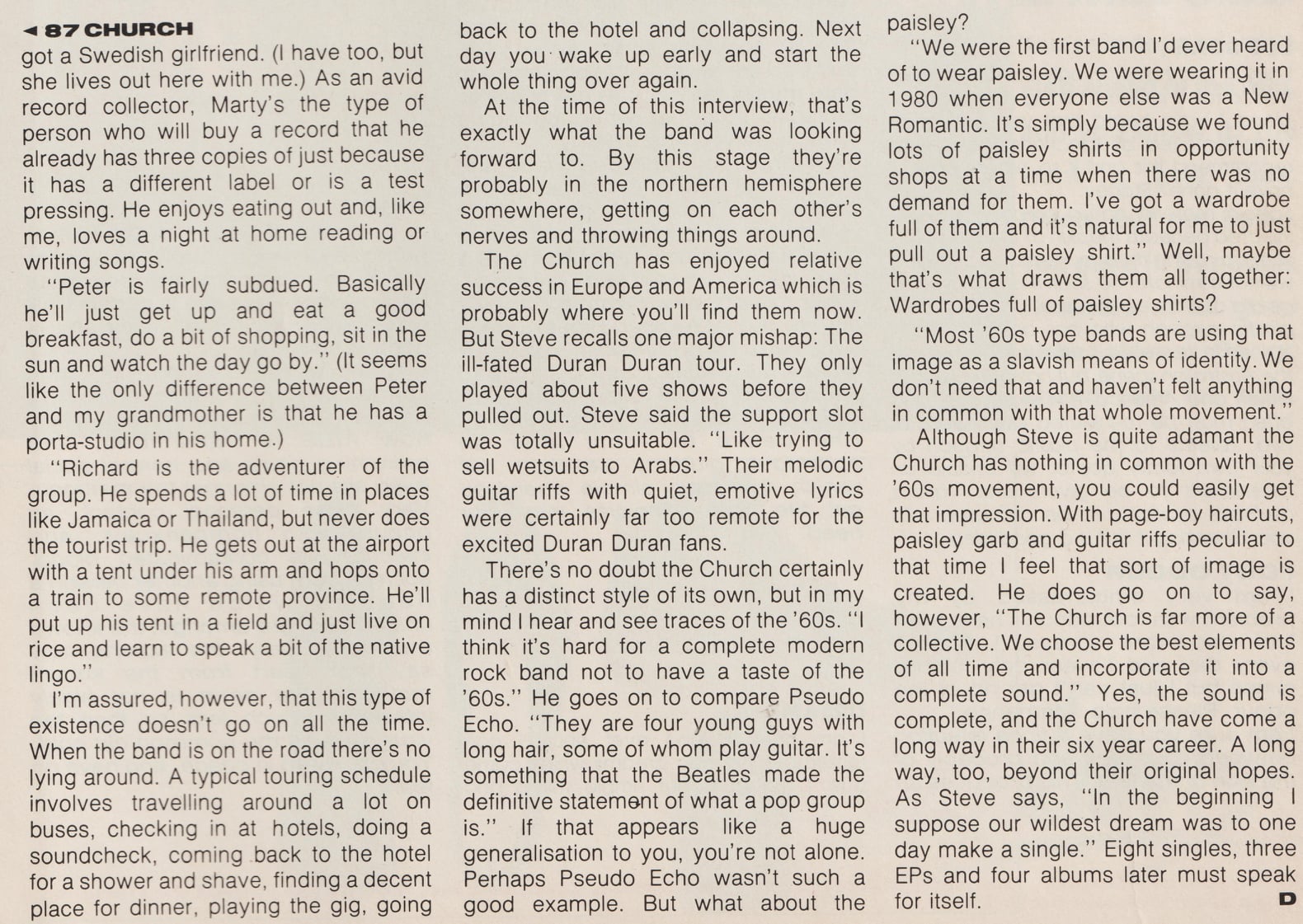
Dolly - April 1986




Dolly - April 1986



(transcription from the old Shadow Cabinet website)
This is from Dolly, April 1986.
No author indicated.
Here Is the Church
by Daphne Sider
And it came to pass that the Church did make a new record. And they did call it Heyday, for it was good. And on the seventh day lead singer Steve Kilbey came to town, and he did converse from on high with Daphne Sider. Here beginneth the lesson:
When I started wearing paisley, so did a band called the Church. (No, I don't think I'm a trendsetter, but neither do they, as they're the first to admit.) For me, that's probably where the attraction started . . . Then I listened to the music . . . Then I met the man.
I didn't know what to expect before meeting Steve Kilbey, lead singer and bass guitarist for the Church. I was impressed by his super-cool, super serious type of image. Like the awesome qualities of their music, I figured on Steve being quite larger than life.
We met at EMl's head office and I was at once relieved. He could have been the guy next door! But he wasn't speaking to me like the guy next door. Steve's image is that of an intelligent, artistic, self-assured individual. Maybe he is just that; I couldn't make up my mind.
"I'm not like some people, living in the suburbs and doing their mundane work thinking, 'Gee, I wonder what it's like to go to nightclubs or take drugs,' because I've done all that."
The Church's new album, Heyday, was released in January this year. It's not a record that will impress those who like to jive and jump around their bedrooms thrashing on an invisible guitar. In typical Church style, Heyday is great for a relaxed afternoon's listening pleasure. But don't get me wrong. It won't send you to sleep. "Already Yesterday" and "Tantalize" are the two superb singles taken from the album. It will surely make up for the lengthy interlude between releases: Seance was their last LP, out in 1983.
The Church was formed six years ago by Steve and guitarist Peter Koppes. They were old friends, having played together in garage bands. In Steve's four-track home studio they put down some great demos, which convinced them to form a band.
Marty Willson-Piper, the other guitarist and backing vocalist, was a friend of a friend of a friend who happened to migrate from England just in time. The drummer, Richard Ploog, was chosen through an ad in the paper.
Their debut single, "She Never Said" was released in November 1980, less than a year after the band's inception. It wasn't the most successful track ever put on vinyl but the one that followed shortly afterwards, "The Unguarded Moment", went on to become a national top ten hit in Australia.
Although that wasn't a guarantee for success, the impression I get from Steve is that no one's really worried. You don't have to be a winner all the time. . .
"You need success and failure to be a complete person and because we've experienced both, I think we've grown up a lot. In retrospect, it's good to fail and not have every utterance you make taken as gospel or not have a thousand people go crazy every time you walk into an auditorium. It does you a lot of good: It builds moral fibre," he says.
So when their contemporaries changed to a more modern approach to music, the Church stuck to their original ideals and played harder on their 12-string guitars. But they have survived, although you'd be right in assuming that for the last couple of years they haven't made much profit for their record company.
The opening lines of their latest single "Tantalize" tells the story: "God I've been asleep so long I've been away, but from software limbo the natives call today."
I'm sure the Church weren't hibernating, although Steve admits they've had a very easy, privileged life. "Each day I felt guilty that I wasn't working. I knew it couldn't go on; I was just lying around in a hammock reading a book."
Musicians can sometimes afford to do this sort of thing. It's not so much a matter of living on what they've earned in the past but rather on what they expect to earn in the future. Steve feels the Church are in a very good position in that they're not big enough to have to cope with the constant demands of touring, yet they're certainly big enough to make a good living out of it.
So what sort of lives do they lead? All four are very health conscious: They are vegetarians and don't drink heavily. Steve is into yoga and meditation, swimming and surfing. Apart from the band he leads a relaxed sort of life -- going for drives, shopping and at night just going out for dinner or to a film. The only band he tends to see regularly is the Crystal Set, as his brother's in it.
But Steve is also kept busy doing band-related work. One thing he's very involved in is the Church's information bureau. (It's like a fan club.) He walks to the post office each day to collect fan letters, which he reads and tries to answer. He really gets a buzz out of that. So if you're interested in writing, you can send a stamped addressed envelope to PO Box 56, Rozelle 2039 NSW.
"Marty," says Steve, "spends a lot of time out of the country. He's English and feels more at home over there. He's also got a Swedish girlfriend. (I have too, but she lives out here with me.) As an avid record collector, Marty's the type of person who will buy a record that he already has three copies of just because it has a different label or is a test pressing. He enjoys eating out and, like me, loves a night at home reading or writing songs.
"Peter is fairly subdued. Basically he'll just get up and eat a good breakfast, do a bit of shopping, sit in the sun and watch the day go by." (It seems like the only difference between Peter and my grandmother is that he has a porta- studio in his home.)
"Richard is the adventurer of the group. He spends a lot of time in places like Jamaica or Thailand, but never does the tourist trip. He gets out at the airport with a tent under his arm and hops onto a train to some remote province. He'll put up histent in a field and just live on rice and learn to speak a bit of the native lingo."
I'm assured, however, that this type of existence doesn't go on all the time. When the band is on the road there's no lying around. A typical touring schedule involves traveling around a lot on buses, checking in at hotels, doing a soundcheck, coming back to the hotel for a shower and shave, finding a decent place for dinner, playing the gig, going back to the hotel and collapsing. Next day you wake up early and start the whole thing over again.
At the time of this interview, that's exactly what the band was looking forward to. By this stage they're probably in the northern hemisphere somewhere, getting on each other's nerves and throwing things around.
The Church has enjoyed relative success in Europe and America, which is probably where you'll find them now. But Steve recalls one major mishap: The ill-fated Duran Duran tour. They only played about five shows before they pulled out. Steve said the support slot was totally unsuitable. "Like trying to sell wetsuits to Arabs." Their melodic guitar riffs with quiet, emotive lyrics were certainly far too remote for the excited Duran Duran fans.
There's no doubt the Church certainly has a distinct style of its own, but in my mind I hear and see traces of the '60s. "I think it's hard for a complete modern rock band not to have a taste of the '60s." He goes on to compare Pseudo Echo. "They are four young guys with long hair, some of whom play guitar. It's something that the Beatles made the definitive statement of what a pop group is." If that appears like a huge generalisation to you, you're not alone. Perhaps Pseudo Echo wasn't such a good example. But what about the paisley?
"We were the first band I'd ever heard of to wear paisley. We were wearing it in 1980 when everyone else was a New Romantic. It's simply because we found lots of paisley shirts in opportunity shops at a time when there was no demand for them. I've got a wardrobe full of them and it's natural for me to just pull out a paisley shirt. "Well, maybe that's what draws them all together: Wardrobes full of paisley shirts?
"Most '60s type bands are using that image as a slavish means of identity. We don't need that and haven't felt anything in common with that whole movement."
Although Steve is quite adamant the Church has nothing in common with the '60s movement, you could easily get that impression. With page-boy haircuts, paisley garb and guitar riffs peculiar to that time I feel that sort of image is created. He does go on to say, however, "The Church is far more of a collective. We choose the best elements of all time and incorporate it into a complete sound." Yes, the sound is complete, and the Church have come a long way in their six year career. A long way, too, beyond their original hopes. As Steve says, "In the beginning I suppose our wildest dream was to one day make a single." Eight singles, three EPs and four albums later must speak for itself.
Return to 1986 index